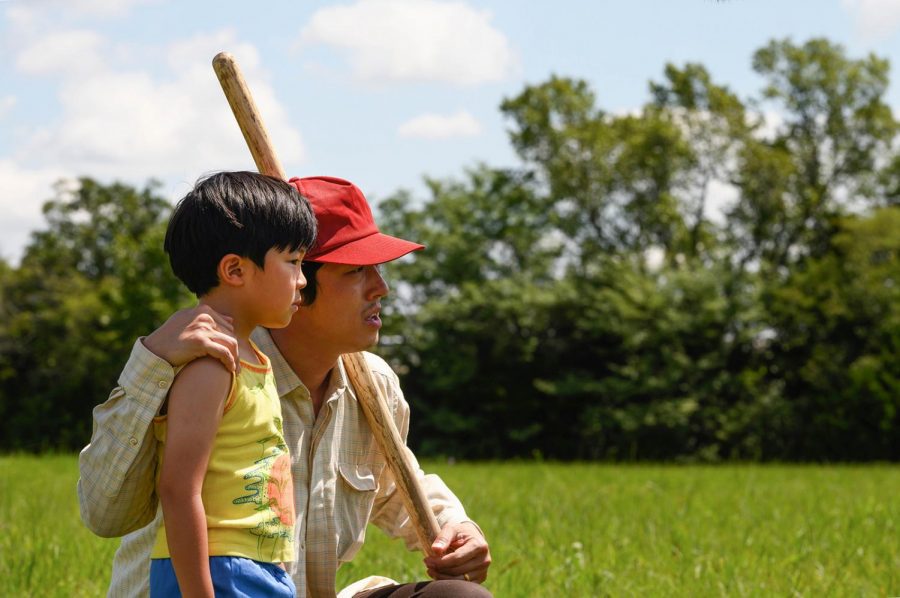“Minari” succeeds as authentic family story
Lee Isaac Chung’s Oscar-nominated film exceeds expectations and places itself at the heart of American cinema
In this scene from “Minari”, Jacob (Steven Yeun) and his son David (Alan Kim) embrace and look out at their 50-acre farm in an attempt to divine water.
March 25, 2021
“Minari” is about as American as a film can get. Isaac Lee Chung’s partially autobiographical masterpiece isn’t at all about glorifying the classic American Dream. Rather, the story seems to put honest people to the task of living up to it.
The film follows the journey of a small Korean family who has just moved all the way from California to rural Arkansas, largely because of the father, Jacob’s (Steven Yeun) drive to start a family farm. The plan is to grow Korean vegetables that the family will then sell to grocers in Dallas, while also chicken sexing to support their livelihood.
However, Jacob’s dream isn’t shared by everyone in the family. His wife, Monica (Yeri Han) is obviously disgruntled from the first five minutes of the movie, upturning her city-dwelling nose at their new home, which is propped up by mud and rocks.
Jacob and Monica’s son, David (Alan Kim) possesses a role that is just as significant as the parent’s in this film — although the film’s apparent disregard of Anne (Noel Kate Cho) proves to be one of the failures of the story. David’s congenital heart defect is a constant concern of the family and one of Monica’s arguments against living on a farm in Arkansas. To appease her, Jacob sends for Monica’s mother Soonja (Youn-Yuh-jung) who does way more than disrupt both the Arkansas Judeo-Christian calm and Jacob’s patriarchal family order.
Soonja, or ‘Grandma’, isn’t your average grandmother — much to the chagrin of young David. She can’t bake cookies, can’t read, doesn’t have a filter and constantly pushes the envelope — and by doing so gets closer to her grandchildren. Youn-Yuh-jung and Alan Kim turn in my favorite two performances of the movie — cultivating a grandmother-son relationship that stands as the heart of the story.
This film deserves every Oscar nomination that it received. Everything from the exceptional cinematography (Lachlane Milne), to the writing (Lee-Isaac Chung), balances authenticity and familiarity. “Minari” has a remarkable depth, best exhibited through its supporting characters.
In addition to Soonja, the evangelical Paul (Will Patton) has a compelling effect on the story of the film — he challenges the independence of Jacob and exists as yet another Arkansas oddity that the Yi family must adapt to. Anyone can watch this movie and feel a connection somewhere within them to the family on-screen. In fact, family is what “Minari” is all about.
“What’s happening now is that shift where we’re just telling our stories as people and it doesn’t have to be in relation to white America or a majority culture. We’re just people. We didn’t want ‘Minari’ to be a ‘by us, for us’ sort of film,” said director Isaac Lee Chung in a recent New York Times roundtable interview.
Regardless of “Minari’s” exclusion from best picture consideration and its Golden Globe foreign language prize, audiences know that the film stands as one of the best of the year — and a truly American film at that.
By the end of “Minari”, I was in tears. Isaac Lee Chung’s deep knowledge of the human character and the inner workings of a family shine through any lackluster elements. The only serious criticisms that have been voiced regard the score and the excessive use of wide shots. Besides this, Chung’s third feature film largely hit its target.
“’Minari’ is about a family trying to learn how to speak a language of its own,” said Chung in his Golden Globe acceptance speech. Although it is a rigorous, tiresome journey for a family to unite, “Minari” made it a joy to watch. I would overwhelmingly recommend this picture to anyone who wants to be inspired, challenged or just to feel good.















